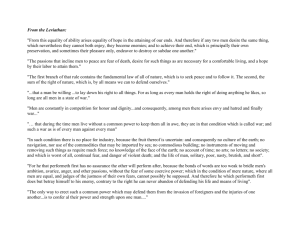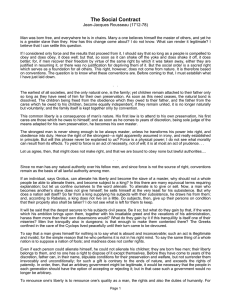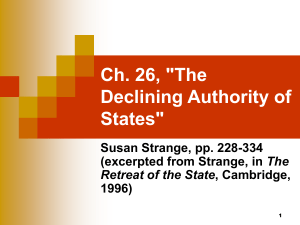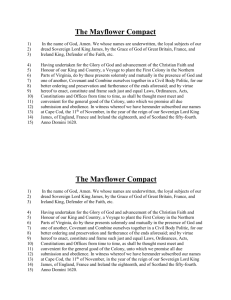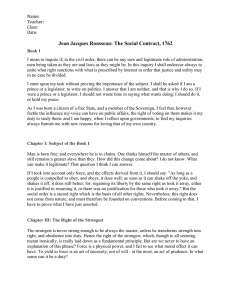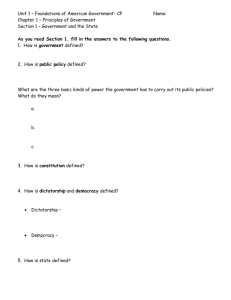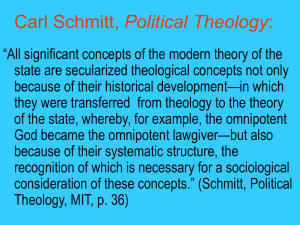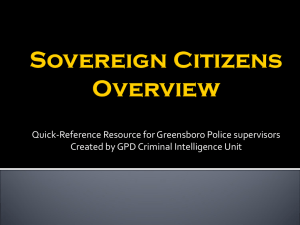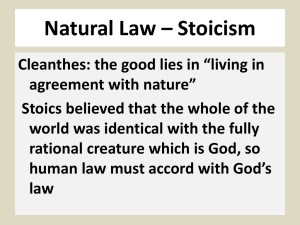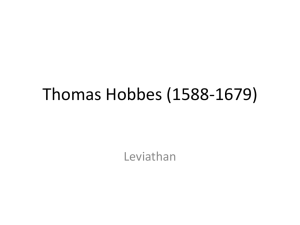Manjari Chatterjee Rousseau—The Social Contract Book I: Chapter
advertisement
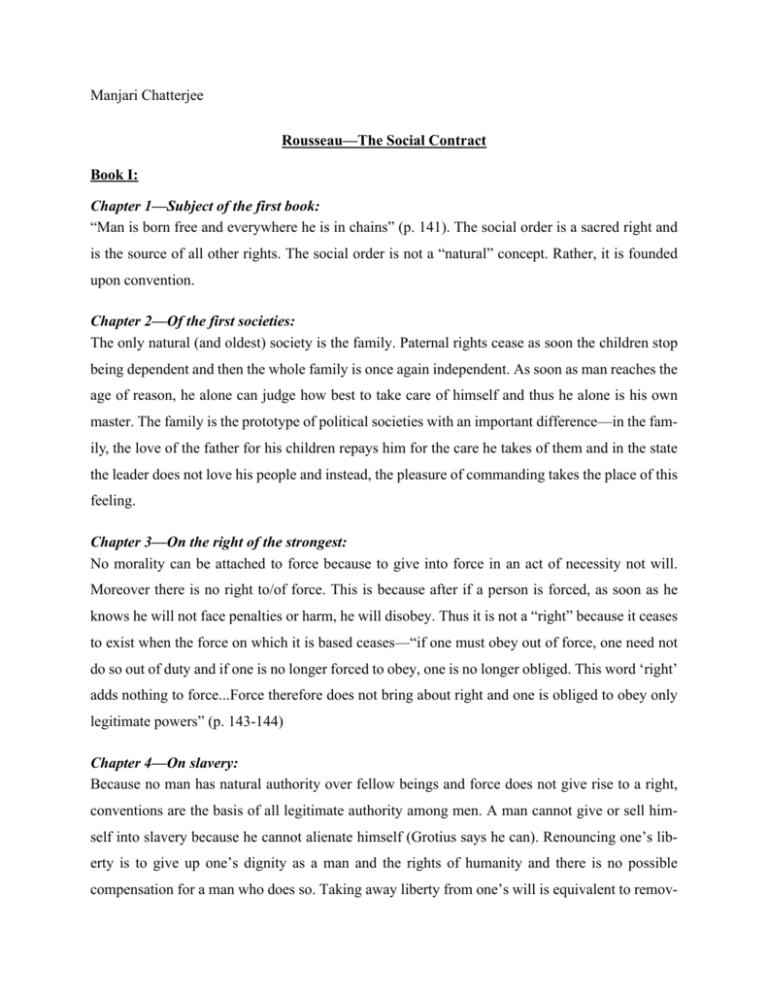
Manjari Chatterjee Rousseau—The Social Contract Book I: Chapter 1—Subject of the first book: “Man is born free and everywhere he is in chains” (p. 141). The social order is a sacred right and is the source of all other rights. The social order is not a “natural” concept. Rather, it is founded upon convention. Chapter 2—Of the first societies: The only natural (and oldest) society is the family. Paternal rights cease as soon the children stop being dependent and then the whole family is once again independent. As soon as man reaches the age of reason, he alone can judge how best to take care of himself and thus he alone is his own master. The family is the prototype of political societies with an important difference—in the family, the love of the father for his children repays him for the care he takes of them and in the state the leader does not love his people and instead, the pleasure of commanding takes the place of this feeling. Chapter 3—On the right of the strongest: No morality can be attached to force because to give into force in an act of necessity not will. Moreover there is no right to/of force. This is because after if a person is forced, as soon as he knows he will not face penalties or harm, he will disobey. Thus it is not a “right” because it ceases to exist when the force on which it is based ceases—“if one must obey out of force, one need not do so out of duty and if one is no longer forced to obey, one is no longer obliged. This word ‘right’ adds nothing to force...Force therefore does not bring about right and one is obliged to obey only legitimate powers” (p. 143-144) Chapter 4—On slavery: Because no man has natural authority over fellow beings and force does not give rise to a right, conventions are the basis of all legitimate authority among men. A man cannot give or sell himself into slavery because he cannot alienate himself (Grotius says he can). Renouncing one’s liberty is to give up one’s dignity as a man and the rights of humanity and there is no possible compensation for a man who does so. Taking away liberty from one’s will is equivalent to remov- ing all morality from one’s actions. (Even if he could alienate himself (which is absurd), he certainly cannot alienate his children—they are born free and their liberty belongs to them). Also right to slavery through war (another one of Grotius’ gems) is absurd because men are not naturally enemies—war is a relationship between one state and another, not between individual men. The words ‘slavery’ and ‘right’ are contradictory and mutually exclusive. It is nonsense to say “I make a convention with you which is wholly at your expense and wholly to my advantage and for as long as it pleases me I will observe it and so will you” (p. 147). Chapter 5—That it is always necessary to return to a first convention: A despot-ruled society is one of master and slave—an aggregation and not an association—there is no public good or body politic. (Grotius says) People may choose a king but this presupposes a public deliberation. Hence it is necessary to first examine the act whereby a people is a people. Chapter 6—On the social compact: Men eventually reach a point where obstacles that are harmful to the state of nature gain the upper hand. Thus man would perish unless he altered his mode of existence. But men cannot engender new forces but only unite and organize existing ones. They, thus “form by aggregation a sum of forces that could gain the upper hand” (p. 147). This sum of forces can only come about with the cooperation of many. They must thus find a form of association which defends and protects all and each while uniting with all, obeys only himself and remains as free as before. The social contract is an answer to this problem because “each of us places his person and all his power in common under the supreme direction of the general will and as one we receive each member as an indivisible part of the whole” (p. 148). This association is a ‘republic’ and is called a ‘state’ when it is passive, ‘sovereign’ when it is active’ and the associates are a ‘people’ and are called ‘citizens’ insofar as they are participants in sovereign authority and ‘subjects’ insofar as they are subject to the laws of the state. Chapter 7—On the sovereign: The sovereign is formed entirely from private individuals who make it up and hence cannot have an interest contrary to theirs. The sovereign power has thus no need to offer a guarantee to its subjects because it is impossible for the body to harm its members. The sovereign, by the mere fact of its existence, is all that it should be. However since each individual can have a private will which is contrary to the general will he has as a citizen, the social contract implies that whoever refuses to obey the general will can be forced to do so by the entire body—“he will be forced to be free” (p. 150). Chapter 8—On the civil state: The passage from state of nature to the civil state changes man. It substitutes justice for instinct in his behavior and gives his actions a moral quality they previously lacked. He is thus ennobled and transformed into an intelligent being. What he loses through the social contract is his natural liberty and the unlimited right to everything that he can acquire. What he gains is civil liberty and the proprietary ownership of all that he possesses. Most importantly, he gains moral liberty which is the only thing that can make man truly his own master. (TA-DAH!) Book II: Chapter 1—That sovereignty is inalienable: State is instituted for the common good and only the general will can direct the forces of the state towards this purpose. Since sovereignty is nothing but the exercise of the general will it can never be alienated. Moreover, the sovereign is a collective being and cannot be represented by anything but itself. The moment there is a master, there is no longer a sovereign and the body politic is thus destroyed. The commands of leaders however can be manifestations of the general will as long as the sovereign, who is free to oppose them, does not do so. Chapter 2—That sovereignty is indivisible: Sovereignty is indivisible for the same reason that it is inalienable—the general will is either the will of the entire people as a whole or it is not. In the former, this will is an act of sovereignty and constitutes law and in the latter, it is a private will not general will. Chapter 3—Whether the general will can err: The general will is always right and always tends towards the public utility (p. 155). (Then R. starts fudging a bit here). However, though the populace wants what’s good for the whole they do not always see what that good is. Thus, the populace cannot be corrupted but it can be tricked and therefore it may appear to want what is bad. The populace is usually tricked through intrigues and partial associations and thus, for the general will to be well articulated it is important to prevent any partial associations in society. Chapter 4—On the limits of sovereign power: The social contract gives the body politic an absolute power over all its members and this power is directed by the general will and called sovereignty. A citizens should render to the state all the services he can as soon as the sovereign demands them. However, the sovereign cannot impose any fetters that are not of any use to the community. “The commitments that bind us to the body politic are obligatory only because they are mutual and their nature is such that in fulfilling them one cannot work for someone else without also working for himself” (p. 157). Chapter 5—On the right of life or death: How can private individuals who have no right to dispose of their own lives transfer to the sovereign this very right which they don’t have. They can because the social contract’s purpose is the conservation of the contracting parties. Whoever wills this end, also wills the means and these means are “inseparable from some risks, even some losses” (p. 159). Those who wish to preserve their lives at the expense of others should also give it up for them when necessary. Chapter 6—On law: All justice comes from God—but the reason we need laws is because we don’t know how to receive it from so exalted a source. When the entire populace enacts a statute concerning the entire populace—this act is called a law. The law regards subjects as a body and actions in the abstract and does not concern itself with man as an individual or a particular action. E.g.. the law can enact a statute saying that there can be privileges but it cannot bestow them by name on any individual. Every state ruled by laws is a republic regardless of the form its administration may take—every legitimate government is republican (p. 162). Chapter 7—On the legislator: The populace always wants the good but does not always see it and the good path it seeks must be pointed out to it. Hence, there is need of a legislator (fudge, fudge, fudge). The legislator has to be an extraordinary man (with a great soul) who will dare to change human nature i.e. transform each individual into part of a larger whole from which he will receive his life and his being. Justice: Entry into the social contract (is vague about whether it ensures justice or is justice) Virtue: No explicit mention of it in the social contract except for the legislator who must be a great soul. Human nature: Noble in the state of nature, controlled and channelled through self-interest in the social contract Why leave State of Nature: Because you need to found a social order which will be the basis for all rights and ensure your liberty. Equality: Humans are equal in the state of nature and are again equal after the social contract because the general will ensures the common good. Freedom: For Rousseau is important but is not necessarily a negative concept (unlike Hobbes). There is freedom from but also freedom of and freedom to. All this is ensured by the general will. The contract is a way to ensure your private freedom even while giving up certain liberties. The contract is all-important because it ensures the most precious thing of all—moral liberty. This is a move away from Hobbes and Locke where men enter the social contract just to fulfill their basic needs. But Rousseau feels the social contract is necessary in order to also experience virtue, truth and beauty—this is a kind of reconciliation between the ancients and early moderns. The Purpose of the State: the state is nothing but the social contract directed by the general will and is for the conservation of all. Rights: the social contract ensures your rights but your rights are also limited by the sovereign— this limitation has no negative connotations because you are part of the sovereign.
